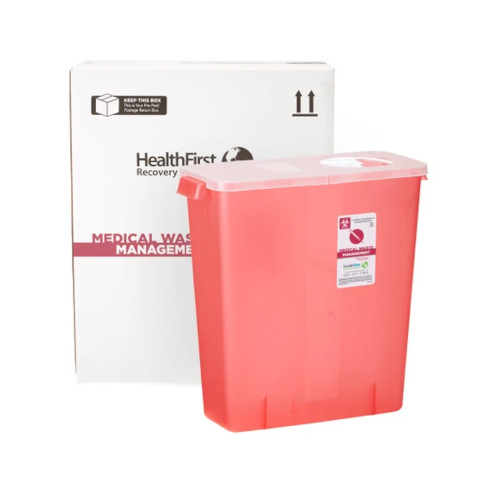Ecological Duty: The Eco-Friendly Strategy to Medical Waste Disposal
Ecological Duty: The Eco-Friendly Strategy to Medical Waste Disposal
Blog Article
Comprehending the Various Types of Waste Disposal Methods
In the world of waste management, the range of disposal methods offered today is substantial and differed, each method serving an unique objective in resolving the challenge of waste disposal. click here. From reusing techniques that intend to offer brand-new life to materials, to the elaborate processes of contaminated materials administration, the landscape of waste disposal is complicated yet critical for environmental sustainability. Understanding the nuances of these various techniques not only clarifies the relevance of liable waste monitoring but also prompts us to reconsider our technique in the direction of garbage disposal in a swiftly advancing globe

Recycling Methods
Reusing techniques are essential for lasting waste monitoring methods in both domestic and commercial setups. medical waste removal near me. By implementing reliable recycling methods, a considerable quantity of waste can be diverted from land fills, saving all-natural resources and minimizing the environmental influence of production procedures
In houses, curbside recycling programs play a vital duty in encouraging houses to separate recyclable products from general waste. Materials such as paper, plastics, glass, and steels can be sorted and gathered for handling into brand-new items, reducing the demand for resources and energy-intensive production procedures.
Industrial facilities likewise rely upon recycling techniques to minimize waste generation and advertise a round economy. By carrying out closed-loop systems, organizations can reuse materials within their manufacturing procedures, decreasing expenses and ecological impact. medical waste disposal. In addition, commercial recycling programs usually include collaborations with specialized reusing facilities to guarantee that materials are appropriately arranged, processed, and rehabilitated right into the supply chain
Composting Strategies

Aerated static heap composting involves blending natural waste materials in a big pile and consistently transforming it to make sure correct aeration. This technique is appropriate for smaller-scale procedures and households.
In-vessel composting entails placing natural waste in a shut container with controlled problems for temperature level and aeration. This approach is efficient for taking care of food waste in urban areas. Windrow composting consists of creating long rows of organic waste and on a regular basis transforming them to promote decomposition. This strategy is commonly used in agricultural setups.
Garbage Dump Disposal
Garbage dump disposal is a frequently used method for managing waste that can not be reused or composted. Methane gas, a result of disintegrating organic waste in landfills, is frequently gathered and made use of as a resource of sustainable power. Efforts to lower dependence on garbage dumps include advertising waste decrease, recycling, and discovering different waste disposal techniques to minimize the environmental impact linked with standard garbage dump disposal practices.

Waste-to-Energy Incineration
Incineration of waste for power generation is an approach increasingly being thought about as an alternative to conventional land fill disposal strategies. Waste-to-energy incineration involves the burning of waste products at high temperatures, normally in specialized centers designed to produce electrical energy or warmth through the process - click here. This strategy not only minimizes the quantity of waste that would otherwise be predestined for garbage dumps however also harnesses the heat produced throughout incineration to create energy
Among the vital benefits of waste-to-energy incineration is its ability to produce electrical energy while minimizing the environmental effect compared to standard land fill disposal methods. By converting waste into energy, this technique aids in lowering greenhouse gas emissions and reliance on nonrenewable fuel sources for energy generation. Furthermore, waste-to-energy facilities are geared up with sophisticated air pollution control innovations to alleviate possible toxic wastes launched throughout the burning procedure.
Hazardous Waste Management

Thinking about the important value of accountable waste management practices, specifically in the world of ecological sustainability, the focus currently changes towards the elaborate domain of Contaminated materials Management. Harmful waste positions significant threats to both human wellness and the atmosphere, necessitating customized handling and disposal methods. Common examples of unsafe waste consist of chemicals, batteries, pesticides, and digital waste.
Contaminated materials Management entails the identification, collection, transport, therapy, and disposal of materials regarded potentially dangerous or dangerous. This process calls for adherence to stringent guidelines and guidelines to mitigate negative influence on ecological communities and public health and wellness. Numerous methods are used in managing hazardous waste, consisting of recycling, secure land fills, encapsulation, and chemical treatment.
Appropriate Contaminated Materials Management is critical for avoiding contamination of dirt, water sources, and air pollution. It is navigate to this site essential for markets, research laboratories, healthcare centers, and various other generators of hazardous waste to carry out durable management methods, training programs, and emergency situation reaction prepares to make certain the safe handling and disposal of these materials. Failing to take care of hazardous waste properly can have significant effects, underscoring the significance of responsible and persistent methods in this area.
Verdict
In final thought, waste disposal techniques play an important role in managing and decreasing the influence of waste on the setting. It is vital for people and markets to comprehend the different waste disposal techniques readily available and pick the most proper technique for sustainable waste monitoring.
In the world of waste administration, the array of disposal strategies offered today is large and differed, each technique serving a distinct objective in attending to the challenge of waste disposal. click here. From recycling methods that intend to provide new life to products, to the complex processes of hazardous waste monitoring, the landscape of waste disposal is complicated yet important for environmental sustainability. Recognizing the nuances of these different strategies not only sheds light on the relevance of accountable waste management yet likewise prompts us to reassess our method in the direction of waste disposal in a quickly advancing globe
Efforts to lower reliance on landfills consist of promoting waste reduction, reusing, and checking out alternative waste disposal techniques to minimize the ecological footprint linked with conventional land fill disposal practices.
It is vital for individuals and markets to recognize the different waste disposal strategies available and select the most appropriate technique for lasting waste management.
Report this page